De Tsjechische schrijver en politicus Václav Havel werd op 5 oktober 1936 in Praag geboren. Zie ook mijn blog van 5 oktober 2009 en ook mijn blog van 5 oktober 2010 en eveneens alle tags voor Václav Havel op dit blog.
Uit:The Power of the Powerless (Vertaald door Paul Wilson)
“A specter is haunting Eastern Europe: the specter of what in the West is called “dissent.” This specter has not appeared out of thin air. It is a natural and inevitable consequence of the present historical phase of the system it is haunting. It was born at a time when this system, for a thousand reasons, can no longer base itself on the unadulterated, brutal, and arbitrary application of power, eliminating all expressions of nonconformity. What is more, the system has become so ossified politically that there is practically no way for such nonconformity to be implemented within its official structures.
Who are these so-called dissidents? Where does their point of view come from, and what importance does it have? What is the significance of the “independent initiatives” in which “dissidents” collaborate, and what real chances do such initiatives have of success? Is it appropriate to refer to “dissidents” as an opposition? If so, what exactly is such an opposition within the framework of this system? What does it do? What role does it play in society? What are its hopes and on what are they based? Is it within the power of the “dissidents”—as a category of subcitizen outside the power establishment—to have any influence at all on society and the social system? Can they actually change anything?
I think that an examination of these questions—an examination of the potential of the “powerless”—can only begin with an examination of the nature of power in the circumstances in which these powerless people operate.
Our system is most frequently characterized as a dictatorship or, more precisely, as the dictatorship of a political bureaucracy over a society which has undergone economic and social leveling. I am afraid that the term “dictatorship,” regardless of how intelligible it may otherwise be, tends to obscure rather than clarify the real nature of power in this system. We usually associate the term with the notion of a small group of people who take over the government of a given country by force; their power is wielded openly, using the direct instruments of power at their disposal, and they are easily distinguished socially from the majority over whom they rule. One of the essential aspects of this traditional or classical notion of dictatorship is the assumption that it is temporary, ephemeral, lacking historical roots. Its existence seems to be bound up with the lives of those who established it. It is usually local in extent and significance, and regardless of the ideology it utilizes to grant itself legitimacy, its power derives ultimately from the numbers and the armed might of its soldiers and police. The principal threat to its existence is felt to be the possibility that someone better equipped in this sense might appear and overthrow it.”

Václav Havel (5 oktober 1936 – 18 december 2011)
De Argentijnse dichter, essayist en literatuurwetenschapper Roberto Juarroz werd geboren in Coronel Dorrego op 5 oktober 1925. Zie ook mijn blog van 5 oktober 2009 en ook mijn blog van 5 oktober 2010 en eveneens alle tags voor Roberto Juarroz op dit blog.
Uit: Vertical Poetry: Last Poems
We die from being alive.
The more alive, the more we die.
No one dies from being dead.
Therefore, some people,
in order not to die,
prefer to be dead.
Thus two opposite stories are written:
some biographical chronicles,
innumerable necrographical notes
with a few jottings about what is alive.
The apparent monolithic relationship
between lives and deaths
becomes a patio of mosaics then
with many capricious drawings.
And in that patio a child is playing
who doesn’t even look at the drawings.
*
The answers have all been used up.
Perhaps they never existed
and were only mirrors
face to face with emptiness.
But now the questions have also been used up.
The mirrors have broken,
even those that reflected nothing.
And there’s no way to fix them.
Still,
perhaps a question remains somewhere.
Silence is also a question.
A mirror remains that can’t be broken
because it faces nothing,
because it’s inside everything.
We’ve found a question.
Can silence also be an answer?
Perhaps a certain heights
questions and answers are exactly the same.
Vertaald door Mary Crow
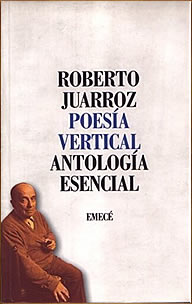
Roberto Juarroz (5 oktober 1925 – 31 maart 1995)
Cover
De Zweedse schrijver en journalist Stig Dagerman werd geboren op 5 oktober 1923 in Älvkarleby. Zie ook alle tags voor Stig Dagerman op dit blog en ook mijn blog van 5 oktober 2010.
Uit: To kill a child
« It’s a peaceful day as sunlight settles onto the fields of the plain. Soon bells will be ringing, because today is Sunday. Between fields of rye, two children have just come upon a footpath that they have never taken before, and in the three villages along the plain, window panes glisten in the sun. Men shave before mirrors propped on kitchen tables, women hum as they slice up cinnamon bread for the morning meal, and children sit on kitchen floors, buttoning the fronts of their shirts. This is the pleasant morning of an evil day, because on this day a child will be killed in the third village by a cheerful man. Yet the child still sits on the kitchen floor, buttoning his shirt. And the man who is still shaving talks of the day ahead, of their rowing trip down the creek. And still humming, the woman places the freshly cut bread on a blue plate.
No shadows pass over the kitchen, and yet even now the man who will kill the child stands near a red gas pump in the first village. He’s a cheerful man, looking through the view-finder of his camera, framing a shot of a small blue car and a young woman who stands beside it, laughing. As the woman laughs and the man snaps the charming picture, the attendant screws their gas cap on tightly. He tells them it looks like a good day for a drive. The woman gets into the car, and the man who will kill the child pulls out his wallet. He tells the attendant they’re driving to the sea. He says when they reach the sea they’ll rent a boat and row far, far out. Through her open window, the woman in the front seat hears his words. She settles back and closes her eyes. And with her eyes closed she sees the sea and the man sitting beside her in a boat. He’s not an evil man. He’s carefree and cheerful. Before he climbs into the car, he stands for a moment in front of the grille, which gleams in the sun, and he enjoys the mixed aroma of gasoline and lilacs. No shadows fall over the car, and its shiny bumper has no dents, nor is it red with blood.”
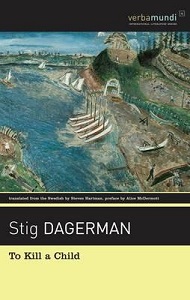
Stig Dagerman (5 oktober 1923 – 5 november 1954)
Cover
De Nederlandse dichter, schrijver en journalist K. L. Poll, (volledige naam Kornelis Lubbertus Poll) werd geboren in Dordrecht op 5 oktober 1927. Zie ook alle tags voor K. L. Poll op dit blog.
Uit: Het Meer van de Ondank. Een tijdgedicht
Oktober
2
De hemel slibt dicht,
de ruimte wordt kleiner.
De triomf van de kleuren
vermindert, verdunt.
Keer terug naar de winter.
De hand van de meester
vertekent de dingen
ook jou en ook mij.
3
Gedenk de witte stam van de berk
hoog tussen duizenden gele blaadjes,
dansmeester in de herfst,
stevig wit zonnig hout
dat straks ook de sneeuw zal leiden
op de maat van strenge, aanhoudende muziek.
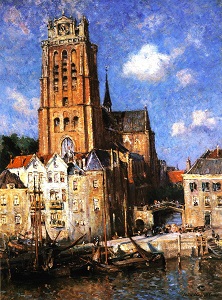
K.L. Poll (5 oktober 1927 – 14 november 1990)
Dordrecht Harbor door Colin Campbell Cooper, ca.1898
De Ierse schrijver Flann O’Brien werd geboren op 5 oktober 1911 in Strabane, County Tyrone. Zie ook mijn blog van 5 oktober 2009 en ook mijn blog van 5 oktober 2010 en eveneens alle tags voor Flann O’Brien op dit blog en alle tags voor O’Brien op dit blog.
The Workman’s Friend
When things go wrong and will not come right,
Though you do the best you can,
When life looks black as the hour of night –
A pint of plain is your only man.
When money’s tight and hard to get
And your horse has also ran,
When all you have is a heap of debt –
A pint of plain is your only man.
When health is bad and your heart feels strange,
And your face is pale and wan,
When doctors say you need a change,
A pint of plain is your only man.
When food is scarce and your larder bare
And no rashers grease your pan,
When hunger grows as your meals are rare –
A pint of plain is your only man.
In time of trouble and lousey strife,
You have still got a darlint plan
You still can turn to a brighter life –
A pint of plain is your only man.
Flann O’Brien (5 oktober 1911 – 1 april 1966)
Standbeeld in Strabane
De Franse schrijver, filosoof en kunstcriticus Denis Diderot werd geboren in Langres op 5 oktober 1713. Zie ook alle tags voor Denis Diderot op dit blog en ook mijn blog van 5 oktober 2010.
Uit: Brieven aan Sophie (Vertaald door Anneke Brassinga)
“O, we misten hem deerlijk, onze vriend! Het heerlijkst moment aan tafel was toen we ons hart uitstortten, onze afwezige vrienden ten tonele voerden en hun lof zongen! Wat een warmte in onze bewoordingen, in onze gevoelens en ideeën! Wat een geestdrift! Wat een vreugde schonk het ons, over hen te praten! Hoe graag zouden zij ons hebben aangehoord! O, beste Grimm, wie zal u mijn woorden overbrengen?
We zaten lang aan tafel, maar de tijd vloog om. Daarna togen we naar het hogergelegen deel van de tuinen. Het viel me in dat waterpartijen altijd het mooist zijn als er een cascade bij is of een stroom, maar dat die ontbreken in deze tuinen. We spraken over kunst, poëzie, filosofie en liefde; over de glorie en nietigheid van onze ondernemingen, over het gevoel, de aaltjes van onsterfelijkheid, over mensen, goden en vorsten; over ruimte en tijd, leven en dood. Het was een koor van stemmen waarin de dissonanten van de baron steeds de boventoon voerden. Toen de wind opstak en de avond kil begon te worden keerden we naar het rijtuig terug.
Baron Von Gleichen heeft veel gereisd. Op de terugweg onderhield hij ons met verhalen, over de staatsinquisiteurs in Venetië, die altijd tussen de biechtvader en de beul in lopen, over de barbaarse ideeën aan het Siciliaanse hof, waar men een antieke zegekar met bas-reliëfs, paarden en al aan de monniken heeft gegeven, die het brons hebben gesmolten om er kerkklokken van te gieten. We kwamen erop doordat in Marly een cascade is afgebroken, waarvan het marmer nu de kapelmuren van de St.-Sulpice siert. Ik zei niet veel. Ik luisterde, of liet mijn gedachten dwalen.”
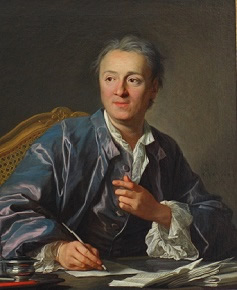
Denis Diderot (5 oktober 1713 – 31 juli 1784)
Portret door Louis-Michel van Loo, 1767
De Duitse schrijfster Charlotte Link werd geboren op 5 oktober 1963 in Frankfurt am Main. Zie ook alle tags voor Charlotte Link op dit blog.
Uit: Die Entscheidung
„Sie brauchte tatsächlich nur ein paar Sekunden, um das Türschloss zu öffnen. Mithilfe eines Drahtes, den sie geformt und gebogen hatte, genau so, wie es ihr Boris, ihr großer Bruder, vor vielen Jahren gezeigt hatte. Sie war noch ein kleines Mädchen gewesen, Boris hingegen schon erwachsen, und jeder, der seine speziellen Hobbys kannte, hätte vermutlich darauf gewettet, dass er eines Tages eine kriminelle Karriere hinlegen würde: Er übte beständig, Türschlösser zu knacken oder Fenster aufzuhebeln, und er hatte beachtliche Fähigkeiten darin entwickelt. Aber schließlich war er ein grundsolider Tischler geworden. Es hatte nie auch nur die geringste Gesetzesübertretung in seinem Leben gegeben.
Selina schob die Tür auf, huschte in das Zimmer, schloss die Tür hinter sich und lehnte sich kurz von innen dagegen. Bislang lief alles nach Plan, vor allem vollkommen lautlos. Trotzdem wusste sie, dass sie jeden Moment entdeckt werden konnte, und dass sie dann vermutlich am besten mit dem Leben abschloss. Wenn Sergej und Igor sie bei einem Fluchtversuch erwischten, war sie so gut wie tot.
Ihre Augen gewöhnten sich an die Dunkelheit, die in dem Zimmer herrschte. Eine Straßenlaterne, die unmittelbar hinter der Grundstücksgrenze stand, spendete ein wenig Licht, gedämpft von einem Baum, der sie zur Hälfte verdeckte. Nur schattenhaft konnte sie die Umrisse der Gegenstände im Raum wahrnehmen: Schreibtisch, Regale, ein Aktenschrank. Taisias Zimmer. Taisia war die Schlimmste.
Sergej und Igor waren brutale Schläger, aber Taisia war derkluge Kopf dahinter, vollkommen kalt, skrupellos und ohne den Anflug eines Gewissens. Hier im Haus war sie die Chefin. Und jeder tat, was sie sagte.”
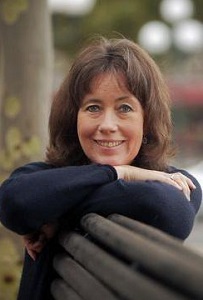
Charlotte Link (Frankfurt am Main, 5 oktober 1963)
De Chileense schrijver José Donoso (eigenlijk Jose Donoso Yáñez) werd geboren op 5 oktober 1924 in Santiago de Chile. Zie ook alle tags voor José Donoso op dit blog en ook mijn blog van 5 oktober 2010.
Uit:L’obscène oiseau de la nuit (Vertaald door Didier Coste)
“Mon père n’avait pas souvenir que de son propre père, le mécanicien de locomotive ; plus loin régnait exclusivement l’obscurité des gens de notre espèce, sans histoire propre à la famille, qui appartiennent à la masse où les identités et les faits s’estompent pour engendrer des légendes et des traditions populaires. Il n’avait pas mémoire de notre histoire, ce n’était qu’un Peñaloza, maître d’école de gosses têtus qui lui tapaient sur les nerfs. J’entends encore la voix de mon père sous notre fétide lampe de paraffine. Le soir, après avoir mangé n’importe quel fricot qui devait d’avantage à l’imagination de ma mère qu’aux matières grasses, mon père traçait des plans pour moi, pour que j’arrive d’une façon ou d’une autre à appartenir à quelque chose de différent du vide de notre triste famille sans histoire ni traditions, ni rites ni souvenirs, et la nuit nostalgique s’allongeait dans l’attente de sa voix insistante qui tombait du plafond dans une petite bassine le contredisait avec obstination. Mon père m’expliquait tout. Il exigeait sans exiger, avec la véhémence de sa main tendre mais pudique qui voulait toucher la mienne sans oser le faire sur le tapis de table brodé par ma sœur, lequel réussissait à dissimuler que la table était ordinaire mais non qu’elle boitait. Oui, papa, oui, c’est possible, pourquoi pas, je vous le promets, je vous le jure qu’au lieu de ce triste visage sans traits des Peñaloza, je vais acquérir un masque magnétique, un visage grand, lumineux, souriant, pleins de caractère, que personne ne manquera d’admirer. Et comme compatissant avec mon entreprise inutile, ma mère levait les yeux une seconde pour me regarder, et puis elle se concentrait à nouveau sur le jupon de quelque richard du quartier, qu’elle était en train de repriser. »
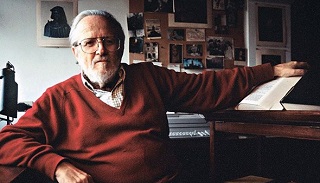
José Donoso (5 oktober 1924 – 7 december 1996)
Onafhankelijk van geboortedata
De Vlaamse dichter en psycholoog Sven Cooremans werd geboren in Rumst 1970. Zie ook alle tags voor Sven Cooremans op dit blog.
De stilte als je weg bent. Ik koop bloemen
De stilte als je weg bent. Ik koop bloemen
om haar te overstemmen, hoor de stilte,
hoor de stilte van de man die de rozen schikt.
De stilte als je weg bent, ik mijn code
ingeef, kijk hoe handen van een ander mijn gebaar
wikkelen in de stilte van de banktransactie.
De stilte als je weg bent en ik thuis
een lege vaas, die doofstom staat, water geef,
en bloemen. De stilte van de bloemen
die niet zingen zolang je weg bent.
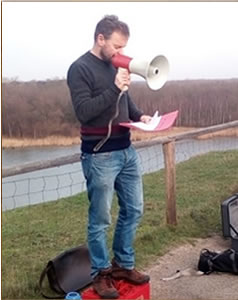
Sven Cooremans (Rumst, 1970)
Zie voor nog meer schrijvers van de 5e oktober ook mijn blog van 5 oktober 2014 deel 2.
